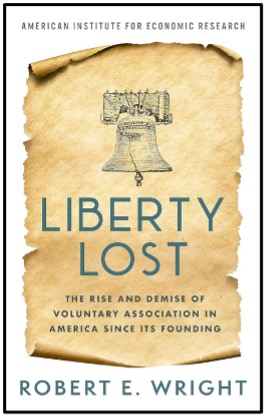The American Institute for Economic Research senior research fellow talks with Michael E. Hartmann about his research, why Tocquevillian voluntary association became such a beneficial part of America’s social contract, the relationship between volunteerism and governmental and individual sovereignty, and the detrimental effect that enlarged government and its taxation had on voluntariness.
Robert E. Wright is a senior research fellow at the American Institute for Economic Research (AEIR) in and the author or co-author of dozens of books and academic-journal articles on economics, finance, and the American Founding, among other things. He has taught business, economics, and policy courses at Augustana University, New York University’s Stern School of Business, Temple University, and the University of Virginia.
Wright’s most-recent book is this year’s Liberty Lost: The Rise and Demise of Voluntary Association in America Since Its Founding. The book offers a history of civil society—including in its philanthropically supported, not-for-profit legal form—and urges a return to the truer, participatory, and voluntary form of democracy that America once knew.

Wright was kind enough to join me for a conversation earlier this month. The just-less-than-15-minute video below is the first part of our discussion; the second is here. In the first part, he talks about AEIR and his research there, why Tocquevillian voluntary association became such a beneficial part of America’s social contract, the relationship between volunteerism and governmental and individual sovereignty, and the detrimental effect that enlarged government and its taxation had on voluntariness.
“I am a policy historian. I’m not an expert on nonprofits per se. I am an expert on ways that government in the past has interacted with the economy,” Wright tells me. “I started getting interested in the history of corporations, both for-profit and nonprofit, and their regulation and how that’s evolved over time.”
From America’s Founding to before the Civil War, “there was this whole sort of culture of forming voluntary associations, for-profit and nonprofit,” according to Wright.
It was just something people learned, even in public schools …. They tried to create a public sphere outside of government. They would tell people, “Hey, if you see a problem and you want to try to fix it, this is how you go about it. You get with some of your neighbors and you form articles of association and you spell out the rules that your organization is going to follow.” If an individual or a group of people didn’t know how to do this, someone within their social circle did or knew a lawyer who could draft the things.
It was “just part of being an American.”
In the American understanding, Wright says, “there’s certainly tension between governmental sovereignty and volunteerism, but not individual sovereignty, as long as it’s kept on a voluntary basis …. I as a sovereign individual can decide whether or not to join a particular voluntary association ….”
Voluntary association’s demise began in the early 20th Century Progressive Era “with the passage of a national income tax. Now, it’s not a sea change because the income tax at first is a not a mass tax. It’s a tax on the wealthiest, the highest-income earners and it’s fairly de minimis,” as Wright tells it. But over time, especially in and after
the New Deal—which is sort of like a “ramping up” of progressive thought—you get the income tax turning into a mass tax. What this does is it starts to crowd out private charity. People start to say things like, “Oh, I gave at the office”—which might mean that they gave to the community chest … but it also could mean, “Yeah, I paid my taxes and so I don’t have any money to spare,” especially in the Great Depression, … “I’ve already given to this cause through my taxes,” rather than in a voluntary way.
Of course, this decreases liberty, because under the old system, we were we making individual decisions about our dollars and time. We’re deciding which causes to support and in which ways. It shifted it to government politicians and bureaucrats deciding how money would be spent to address various social ills.
In the conversation’s second part, Wright talks about the perverse incentives of the tax system on nonprofits, what hypothetically would happen to the third sector absent tax-incentivization, whether progressive Big Philanthropy might do damage to it along with Big Government, and encouraging more bottom-up experimentation in addressing social ills.



